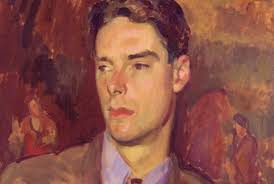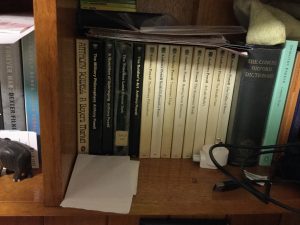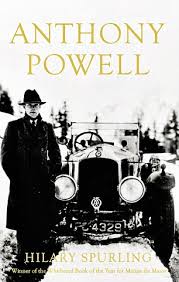Apart from sundry genes, the most important thing I have given my children has been a full set of Anthony Powell’s A dance to the music of time.

The first in this 12-volume novel was published in 1951, the last in 1975. The stories, the writing style and the humour have fascinated and entertained me ever since I came across the first volume, A question of upbringing, around 1970.
At some random stage in the young life of each of my four children they have been presented with a set of the books and given the understanding that it is my favourite work. There is no other rite of this sort to which they have been subject. This makes Anthony Powell and these 12 books matters of great significance to me and, I hope, to them.

Family gatherings have occasionally been regaled with a reading of the opening scene of the first book, which sets the tone for both subject and style of the whole work.
"The men at work at the corner of the street had made a kind of camp for themselves, where, marked out by tripods hung with red hurricane-lamps, an abyss in the road led down to a network of subterranean drain-pipes. Gathered round the bucket of coke that burned in front of the shelter, several figures were swinging arms against bodies and rubbing hands together with large, pantomimic gestures: like comedians giving formal expression to the concept of extreme cold."
The works of Anthony Dymoke Powell (1905 – 2000) have remained in print continuously and have been the subject of TV and radio dramatisations. In 2008, The Times named Powell among their list of “The 50 greatest British writers since 1945”.
Some of the key facts of his life serve almost as a synopsis of the subjects of A Dance to the Music of Time. His father was an officer in the Welsh Regiment and his mother “came from a land-owning family in Lincolnshire”. He went to Eton and Balliol College, Oxford, where he “was awarded a third-class degree at the end of his academic years”. He married Lady Violet Pakenham in 1934. During the second war he served in the Welch Regiment and later the Intelligence Corps. In 1973 he declined an offer of knighthood.
Anthony Powell died near Frome, in Somerset, in March 2000.
One of the characteristics of Powell’s novel is the occurrence of coincidence at what might be regarded as an unlikely rate. People keep meeting in unexpected circumstances with those with whom they have had previous contact; newly-introduced characters turn out to have links with people and events that have gone before.
I have often defended the notion that ‘coincidence’ is more of a reality of life than is connoted by a normal understanding of the word, which goes to its rarity and surprise. Events do seem to recur, albeit with different personnel, and certain people encountered years ago seem incapable of escaping the ebb and flow of one’s own life.
This of course is the dance to which Anthony Powell refers. Often life has a kind of circularity which eventually brings back the partner with whom one traced figures around the floor when the music began.
One of the latest of such coincidences to affect me occurred three weekends ago. Having just read a biography of Paul Keating gave me an appetite for more Australian political biography. Browsing in the splendid Canty’s second-hand bookshop in Fyshwick I selected four titles without too much consideration, one of which is Bob Carr’s My Reading Life – Adventures in the World of Books. Flicking the pages, what attracted me in the Introduction was Carr’s wish that his choice of reading had been informed by what he calls ‘How to Read’ books:
"I needed someone, in effect, to place a comforting arm on my shoulder and say, now Tolstoy isn't that hard. Persist with the Russian names in the first 50 pages. Remember that there are two key characters, Andrey and Pierre.' A bit of guidance, a few clues. That would have been enough. A reader needs a handful of notions so they don't think they're going to drown, some idea of 'Where is this writer taking me?' And that's enough to start."
It wasn’t until I was browsing the book a little more carefully at home that I came across the second chapter entitled Laughing out loud – the best comic writing. Carr begins the chapter with: “This twelve-volume novel may be the best I have ever read. I’ve reread some volumes and felt confirmed in that view.” Later on:
“Powell’s is the major postwar achievement in the English novel. While his work has been described as a combination of Proust and Wodehouse, Powell is consistently funny in a way Proust is not, and his story has none of the roadblocks that sit like indigestible lumps in the middle of Proust’s volumes.”
In order to compile the necessary collections for family members I have frequently made a beeline for “po” on the shelves of the better second-hand bookshops. If they have authors shelved in alphabetical order they almost certainly have also recognised the value and popularity of Anthony Powell’s books.
In the 28 May 1998 issue of the New York Review of Books there is a long essay by the redoubtable Christopher Hitchens (1949-2011)** about Powell and his major work https://bit.ly/2I1tPdw. In typical Hitchens style he provides a strongly intellectual analysis of the politics of the work and its relationship to real political developments of the period. (Incidentally, Hitchens makes half a dozen references to the use of coincidence in Pwell’s work.)
Hitchens is clearly impressed and intrigued with the novels and, like Bob Carr, laments the weakness of the TV production of the work. And rather in the same way as Carr, Hitchens is ultimately unsatisfied, particularly with the closing volume:
"To invert, in fact, what has been so often and unfairly said against Powell, the verdict here [about the last volume] must be that events are random and unstrung rather than intricately coincidental. The series does not end or conclude, still less achieve a resolution. It just stops."
I have been unable to feel dissatisfaction of this type. I kept collecting – perhaps against the possibility of there being yet more members of my immediate family still to come.
Despite the care with which I collected it has been difficult to make collections of all twelve volumes in a single publishing edition. When I began collecting, the titles were in Penguin with that familiar orange livery and some with cover drawings by Osbert Lancaster.
The books were in fact first published by Heinemann in 1960 and then by Penguin in 1964. Once Penguins had become rarer the commonest version was the black-covered series produced by Fontana from 1967. Later editions in Fontana had cover caricatures by Mars.

There followed Flamingo editions (still Fontana) from 1983 – my favourites – with cover drawings by Mark Boxer and, from 1991, Mandarin paperbacks with artwork by the same person.
There is a biography of Anthony Powell by Hilary Spurling. I am yet to find a copy.

** re Christopher Hitchens, from Wikipedia: "Having long described himself as a socialist, Marxist and an anti-totalitarian, he broke from the political left after what he called the "tepid reaction" of the Western left to the Satanic Verses controversy, followed by the left's embrace of Bill Clinton and the antiwar movement's opposition to NATO intervention in Bosnia and Herzegovina in the 1990s. His support of the Iraq War separated him further. - - he regarded concepts of a god or supreme being as a totalitarian belief that impedes individual freedom. He argued that free expression and scientific discovery would eventually replace religion as an ethical code of conduct for human civilization. The dictum "What can be asserted without evidence can be dismissed without evidence" has become known as Hitchens's razor."

Thanks GG
I’ll be adding them to my reading list.
Hi praise from both you and Bob Carr is an endorsement not to be ignored.
“several figures were swinging arms against bodies and rubbing hands together with large, pantomimic gestures:” reminds me of many a moment outside in the Canberra winter.
Stay warm!